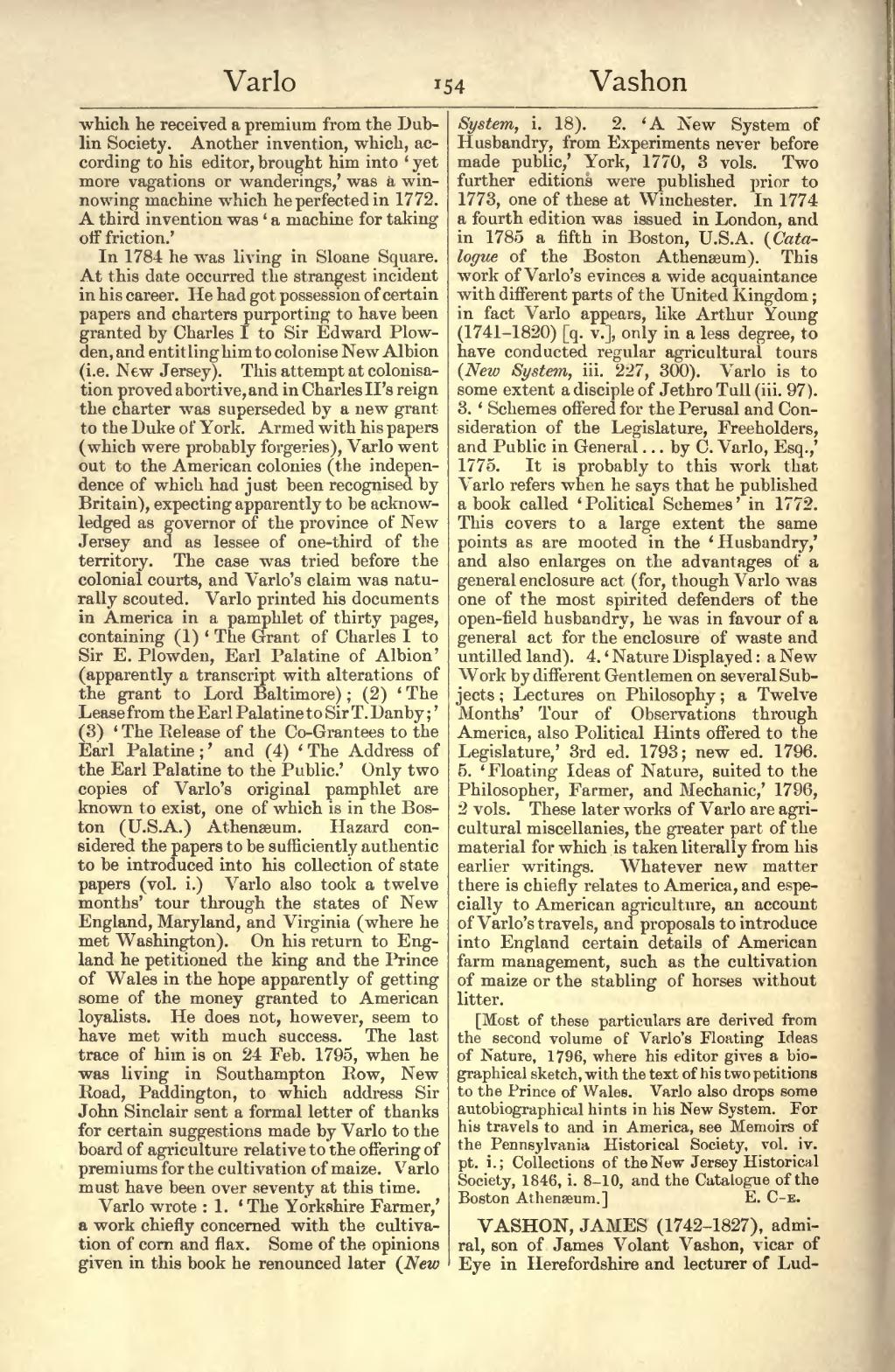which he received a premium from the Dublin Society. Another invention, which, according to his editor, brought him into ‘yet more vagations or wanderings,’ was a winnowing machine which he perfected in 1772. A third invention was ‘a machine for taking off friction.’
In 1784 he was living in Sloane Square. At this date occurred the strangest incident in his career. He had got possession of certain papers and charters purporting to have been granted by Charles I to Sir Edward Plowden, and entitling him to colonise New Albion (i.e. New Jersey). This attempt at colonisation proved abortive, and in Charles II's reign the charter was superseded by a new grant to the Duke of York. Armed with his papers (which were probably forgeries), Varlo went out to the American colonies (the independence of which had just been recognised by Britain), expecting apparently to be acknowledged as governor of the province of New Jersey and as lessee of one-third of the territory. The case was tried before the colonial courts, and Varlo's claim was naturally scouted. Varlo printed his documents in America in a pamphlet of thirty pages, containing (1) ‘The Grant of Charles I to Sir E. Plowden, Earl Palatine of Albion’ (apparently a transcript with alterations of the grant to Lord Baltimore); (2) ‘The Lease from the Earl Palatine to Sir T. Danby;’ (3) ‘The Release of the Co-Grantees to the Earl Palatine;’ and (4) ‘The Address of the Earl Palatine to the Public.’ Only two copies of Varlo's original pamphlet are known to exist, one of which is in the Boston (U.S.A.) Athenæum. Hazard considered the papers to be sufficiently authentic to be introduced into his collection of state papers (vol. i.). Varlo also took a twelve months' tour through the states of New England, Maryland, and Virginia (where he met Washington). On his return to England he petitioned the king and the Prince of Wales in the hope apparently of getting some of the money granted to American loyalists. He does not, however, seem to have met with much success. The last trace of him is on 24 Feb. 1795, when he was living in Southampton Row, New Road, Paddington, to which address Sir John Sinclair sent a formal letter of thanks for certain suggestions made by Varlo to the board of agriculture relative to the offering of premiums for the cultivation of maize. Varlo must have been over seventy at this time.
Varlo wrote: 1. ‘The Yorkshire Farmer,’ a work chiefly concerned with the cultivation of corn and flax. Some of the opinions given in this book he renounced later (New System, i. 18). 2. ‘A New System of Husbandry, from Experiments never before made public,’ York, 1770, 3 vols. Two further editions were published prior to 1773, one of these at Winchester. In 1774 a fourth edition was issued in London, and in 1785 a fifth in Boston, U.S.A. (Catalogue of the Boston Athenæum). This work of Varlo's evinces a wide acquaintance with different parts of the United Kingdom; in fact Varlo appears, like Arthur Young (1741–1820) [q. v.], only in a less degree, to have conducted regular agricultural tours (New System, iii. 227, 300). Varlo is to some extent a disciple of Jethro Tull (iii. 97). 3. ‘Schemes offered for the Perusal and Consideration of the Legislature, Freeholders, and Public in General … by C. Varlo, Esq.,’ 1775. It is probably to this work that Varlo refers when he says that he published a book called ‘Political Schemes’ in 1772. This covers to a large extent the same points as are mooted in the ‘Husbandry,’ and also enlarges on the advantages of a general enclosure act (for, though Varlo was one of the most spirited defenders of the open-field husbandry, he was in favour of a general act for the enclosure of waste and untilled land). 4. ‘Nature Displayed: a New Work by different Gentlemen on several Subjects; Lectures on Philosophy; a Twelve Months' Tour of Observations through America, also Political Hints offered to the Legislature,’ 3rd ed. 1793; new ed. 1796. 5. ‘Floating Ideas of Nature, suited to the Philosopher, Farmer, and Mechanic,’ 1796, 2 vols. These later works of Varlo are agricultural miscellanies, the greater part of the material for which is taken literally from his earlier writings. Whatever new matter there is chiefly relates to America, and especially to American agriculture, an account of Varlo's travels, and proposals to introduce into England certain details of American farm management, such as the cultivation of maize or the stabling of horses without litter.
[Most of these particulars are derived from the second volume of Varlo's Floating Ideas of Nature, 1796, where his editor gives a biographical sketch, with the text of his two petitions to the Prince of Wales. Varlo also drops some autobiographical hints in his New System. For his travels to and in America, see Memoirs of the Pennsylvania Historical Society, vol. iv. pt. i.; Collections of the New Jersey Historical Society, 1846, i. 8–10, and the Catalogue of the Boston Athenæum.]
VASHON, JAMES (1742–1827), admiral, son of James Volant Vashon, vicar of Eye in Herefordshire and lecturer of Lud-
